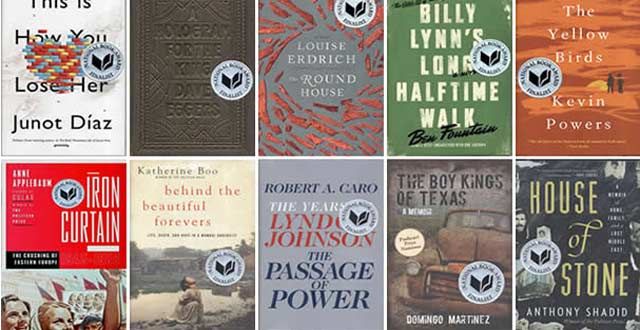 Last week the National Book Award nominees came out, and D.G. Myers hated them. Really hated them. He said “don’t bother” with Louise Erdrich’s The Round House, that Dave Eggers is a middlebrow novelist, that Ben Fountain’s Billy Lynn’s Long Halftime Walk is derivative.
Last week the National Book Award nominees came out, and D.G. Myers hated them. Really hated them. He said “don’t bother” with Louise Erdrich’s The Round House, that Dave Eggers is a middlebrow novelist, that Ben Fountain’s Billy Lynn’s Long Halftime Walk is derivative.
I won’t argue with his dismissal of the selections. But I will argue with why he thought the judges were terrible. His reasoning, apparently, is that they are creative writers rather than critics:
“But the four judges of the Award are creative writers — not a critic among them — and asking them to judge fiction by the criteria of readers instead of writers is like asking cupcake bakers to judge the heartiest foods.”
This is a worrisome attitude for many reasons.
First, can you so neatly divide the skills of individuals into writers and critics? Don’t some critics write fine novels? (James Wood comes to mind). And aren’t some writers excellent critics? (I love Zadie Smith’s essays). Let’s not pigeonhole.
Second, are readers automatically better than writers at judging the quality of writing? This seems like a strange hierarchy. What would he base this hierarchy on? That the only measure of a book is how it seems to a reader? Why don’t writers matter as readers?
Third, why is the criteria of readers different than the criteria of writers? I would like Myers to list criteria that is important to writers that is not important to readers. Attention to language? Nope. Intricacy of vision? No. It seems impossible to make some kind of catch-all category that would apply to all writers and all readers.
Fourth, who is to say that creative writers cannot be readers? What makes critics closer to the work than creative writers? I used to offer an analogy that went something like this: who knows a house better? The architect or homeowners? The architect knows how it was constructed, the materials, the process. The homeowners know every squeaky board, which rooms best muffle sound, and how long water takes to get hot in the kitchen. Architect writers know things and homeowner critics know things. Epistemologically speaking, both forms of knowledge are valuable. If they weren’t incommensurable, I would say they were equal.
Lastly, let’s get to Myer’s malformed simile at the end. I don’t know why he has a vendetta against cupcake makers — I imagine The League of Cupcake Makers is plotting their revenge — but he seems to think that cupcake makers are weak foodies. Lightweights. On the contrary, I would guess any serious cupcake maker would actually have a great palate, and thus would be perfect for judging hearty foods. Epic simile fail.
The upshot is that every once in a while a critic or a creative writer tears out their card of Righteous Opinions and goes on a rant against the other side of the aisle. This is almost always misguided. If I were choosing a committee to award a prize, I might choose two critics and two creative writers. But I don’t think that balance is always necessary.
